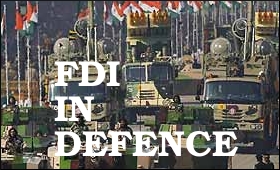In this blogpost, Pranav Rudresh, a student of Lloyd Law College, Greater Noida writes about the current move of the government of introducing 100% FDI in the defense sector along with the upside and the downside to this move.
FDI or Foreign Direct Investment is an investment which is made by any company into a particular economy/country. It is a method of direct investment into any economy. It is a key component in global integration. It is one of the major forms of cross-border investment. A company or enterprise, resident in its nation, can operate its enterprise in another country by investment. FDI is amongst the key issues of foreign policies for almost all the countries. The enterprises based in developed economies can invest directly and open its branches in another country (underdeveloped or developing). It can use its resources for its work and in return give money to the workers. This not only helps in the development of the economy but also gives the workers a fair idea of how an enterprise operates. It provides long lasting interests to the enterprise as well.
The investing company can make its overseas investment in some ways – either by setting up a subsidiary or associate company (with the same name of the company) in the foreign country and also by a partnership with shares of an overseas company, or through a merger or joint venture. In India, the FDI was first brought up after the economic crisis of 1991. Former Prime Minister Manmohan Singh and the then Prime Minister Shri PV Narasimha Rao are credited for bringing FDI in India which relaxed the economy and generated more than one crore jobs. In 2015, India became the largest destination for FDI surpassing China.
An example of FDI can be an Indian company taking a majority stake in a company in China. Another example would be a Canadian company setting up a joint venture to develop a mineral deposit in Chile.
For a developing nation like India where over-population and poverty together are a major issue, FDI is an important sector with which the government can bring employment to all sectors at large scale. Recently, the Modi-led government enacted 100% FDI in defense as well as the civil aviation department (the FDI has been eased in other departments as well such as food, medicine, etc.). It is to be noted that all this FDI has been allowed via approval of the central minister Shri Venkaiyah Naidu as he stated that it is a need of the hour.
The advantages and disadvantages of 100% FDI in defense sector
While this move may prove to be a big boost for our economy, there are some points against it as well. Firstly, let’s take a look at what are the positives of 100% FDI in defense sector:
- FDI is better than debt.
- It will push for growth and development.
- Intends to transform India into one of the manufacturers from one of the largest importers.
- Will bring technological advancement to India.
- Make economy widely open.
Like the two sides of a coin, despite being beneficial, the liberalization of FDI has also bought some negatives. To mention a few:
- Might kill domestic sector.
- Indian investors may not comply with foreign defense manufacturers.
- Most nations would know the defense manufacturing limits of India.
How will FDI be beneficial?
A good FDI can significantly pave the way for an increase in farmers’ income, employment to youth and an impetus for the growth of the small and medium industry. This would help start micro, small and medium industries which would pave the way for jobs to the youth. FDI can lead to the creation of a congenial atmosphere to attract the investment. It is better to take debts and pay them later than loans at higher interest rates that too with the currencies all around the world being highly unstable, especially in a developing country like India.
At present, India is amongst the largest importers of machinery in the defense sector. Compared to the developed countries, India lacks defense equipment production capability. Greater FDI inflow in defense provides a chance of substantive economic
advantages. The increased flow of funds from a foreign source leads to more employment opportunities for the local population. It also means that taxes and other revenues will flow back to the local economy. Most industry associations and foreign firms have demanded that FDI cap be increased to 100 percent since they believe that the Government of India will insist on Indian control over any defense manufacturing company. India’s main aim is technology enhancement and foreign vendors will not transfer critical technologies without ownership and management control of the Indian venture. An increase in FDI levels to 100 percent may thus overcome a few of the drawbacks currently faced by the FDI cap with the previous percentage. The FDI cap thus needs to be at a higher rate so as to make a significant difference to the Indian defense industry.
How will 100% FDI in the defense sector hurt India?
Naturally, it is going to kill the domestic sector and Indian defense manufacturing sector related organizations such as DRDO are going to suffer major setbacks. While the transfer of technology from foreign sources may increase, the advantages of having homemade products will decrease. It is not necessary that the Indian manufacturing sector will be able to give 100% cooperation with the foreign companies. It is a clear fact that Indian companies won’t be able to compete with the international manufacturers. This will even prove to be worse for DRDO, which has not been able to give its 100% since its establishment due to lack of local resources.
One of the major setbacks that India will face with 100% FDI in the defense sector will be that the economies that will invest in production in India will know the defense product manufacturing limit of India. If India aims to be a superpower, it cannot be possible just with the production of what the other developed nation are or have been producing. The technological setback thus makes the FDI a matter of concern.
Conclusion
For a country with hostile neighbours, it is the biggest priority of the government is to ensure its safety. Any economy cannot be self-sufficient, and it is not possible to battle against problems like terrorism just by risking of lives. Technology thus becomes an important tool in covering such hazards. The harsh reality is that our defense sector needs a good overhaul, and our government needs to allocate sufficient budgets for production of defense material. The military expenditure of a developed nation like USA is around 600 billion dollars compared to a mere 65 billion dollar expenditure by India when it comes to maintenance of the army and defense equipment. Thus to achieve the defense capability dreams that India has, higher FDI may be a pure and important source that needs to be brought up. It must however be kept in mind that it does harm the local industries.
 Serato DJ Crack 2025Serato DJ PRO Crack
Serato DJ Crack 2025Serato DJ PRO Crack












 Allow notifications
Allow notifications


